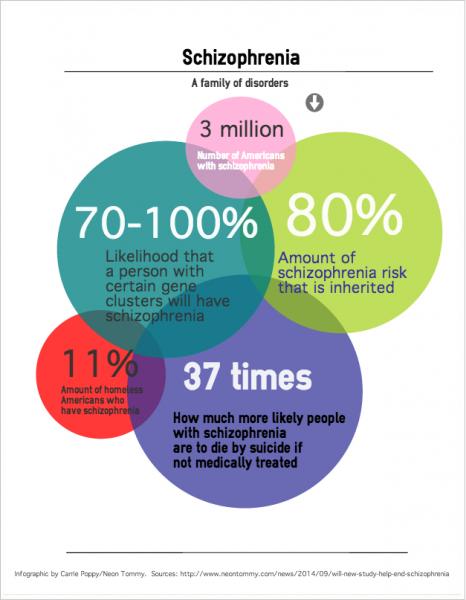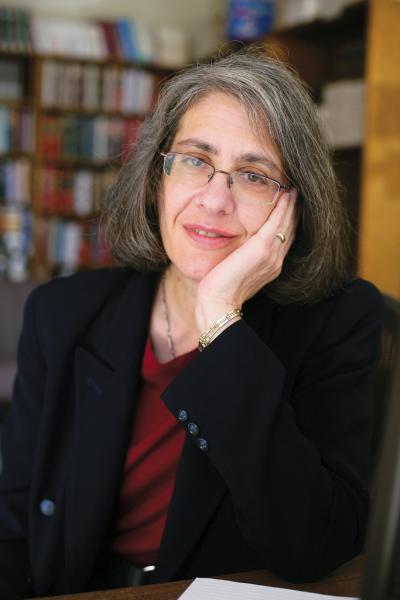Will This New Study Help End Schizophrenia?

In Elyn’s junior year of high school, houses started talking to her.
You are special. You are especially bad. Look closely and ye shall find.
There are many things you must see. See. See.
The houses weren’t speaking — not in the usual, audible sense— but nonetheless, they were transmitting their messages to her, through her own mind.
“I instinctively knew they were not my ideas,” she explains in her autobiography, The Center Cannot Hold: My Journey Through Madness, “They belonged to the houses, and the houses had put them in my head.”
Elyn has schizophrenia. She’s not “a schizophrenic.” This term, she holds, can be dismissive and pigeon-holing. Rather, she is a person with schizophrenia, and she has lived with the accompanying delusions, hallucinations and chaotic thinking virtually all her life.
But Elyn didn’t grow up to be the stereotypical person with schizophrenia. Thanks to modern medicine, she grew up to be Elyn Sacks, PhD, a professor of law at USC, and a MacArthur Fellow. And that line about not being “a schizophrenic”? She delivered it at TEDGlobal2012. Her talk has been viewed over 2 million times.
Professor Saks is just one of the success stories in the medical treatment of schizophrenia. But there are about 3 million others who live with schizophrenia in the United States alone, and 24 million worldwide. So yesterday’s announcement that schizophrenia is likely not one, but as many as eight disorders, could impact treatment for almost as many Americans as there are people in Los Angeles.

"It's very important not to assume that these [findings] present the answer,” he told me. “The reality is that they're each different windows into whats happening and help guide us into developing new treatments." Pato’s caution was echoed by other experts who declined to comment in this article because of some controversy surrounding the finding.
Still, most are hopeful. Dr. Stephen Marder of UCLA has spent virtually his entire career studying schizophrenia, its causes, and how to treat it. He calls the research “very promising.” Marder doesn’t just work in the lab. He also counsels people who have schizophrenia, or who have a loved one who deals with the disease. He says people don’t usually come out about having schizophrenia because of fear of how others will judge them.
”There is a huge stigma,” he said. “It has the unfortunate effect that many people with the illness really don't talk about it openly.” Saks, he notes, “is one extraordinary exception.” Together with Saks and others, Dr. Marder has been working on research of twenty people with schizophrenia who buck expectations of people with mental illness; they hold down jobs, have college degrees, and even, in one case, run a nonprofit.
Saks recently wrote an Opinion piece for the New York Times, in which she explained that work, in fact, helps many people control their schizophrenia symptoms. “Work has been an important part of who I am,” one person in the group relayed to Saks. “When you become useful to an organization and feel respected in that organization, there’s a certain value in belonging there.”
But these people are, by and large, the exception. The U.S. homeless population is disproportionately schizophrenic, and people who don’t treat their schizophrenia with medication are 37 times more likely to die from suicide. It’s statistics like these that drive so much urgent research into schizophrenia’s causes and potential treatments.
The study released Sept 15., which examined more than 4,000 people with schizophrenia (and compared them to people without it), identified gene clusters that were common among individuals with schizophrenia symptoms. Sometimes, if a person had a cluster, it was nearly certain that they would have the associated symptoms (certain clusters carried a likelihood of 70 to 100 percent). In all, they found 42 clusters that spelled a high chance of schizophrenic symptoms, and at least eight distinct disorders under the umbrella we normally call “schizophrenia.” Pato says it is likely even more than eight, with many subtypes for each syndrome.

The greatest part of this news, for researchers and patients alike, is its promise for future treatments. By identifying the clusters at play, future treatments can be much more targeted and specific.
Inherited genes probably play the biggest role, Marder says, but he and Pato both agree that infections could also be a part of the puzzle. For example, Toxoplasma gondii, a parasite best known for living in cat feces, has been pointed to as one potential culprit. But many uncertainties remain.
“What we’ve done here, after a decade of frustration in the field of psychiatric genetics, is identify the way genes interact with each other, how the [genetic] ‘orchestra’ is either harmonious and leads to health, or disorganized in ways that lead to distinct classes of schizophrenia,” senior researcher Dr. C. Robert Cloninger said.
Still, the work continues.
"I believe this is scientifically exciting,” said Pato. “But for me, it is a new question. Is what we found in this data going to prove to be true?”
That’s the big question. And until new treatment emerges, 3 million Americans will be waiting on the answer.
Reach staff reporter Carrie Poppy here or follow her on twitter here.



